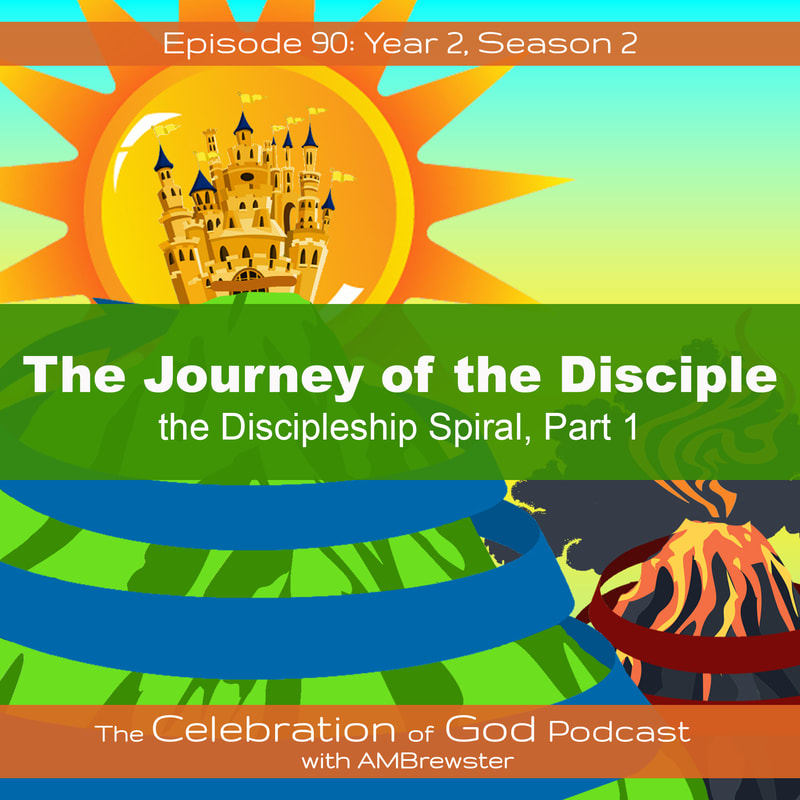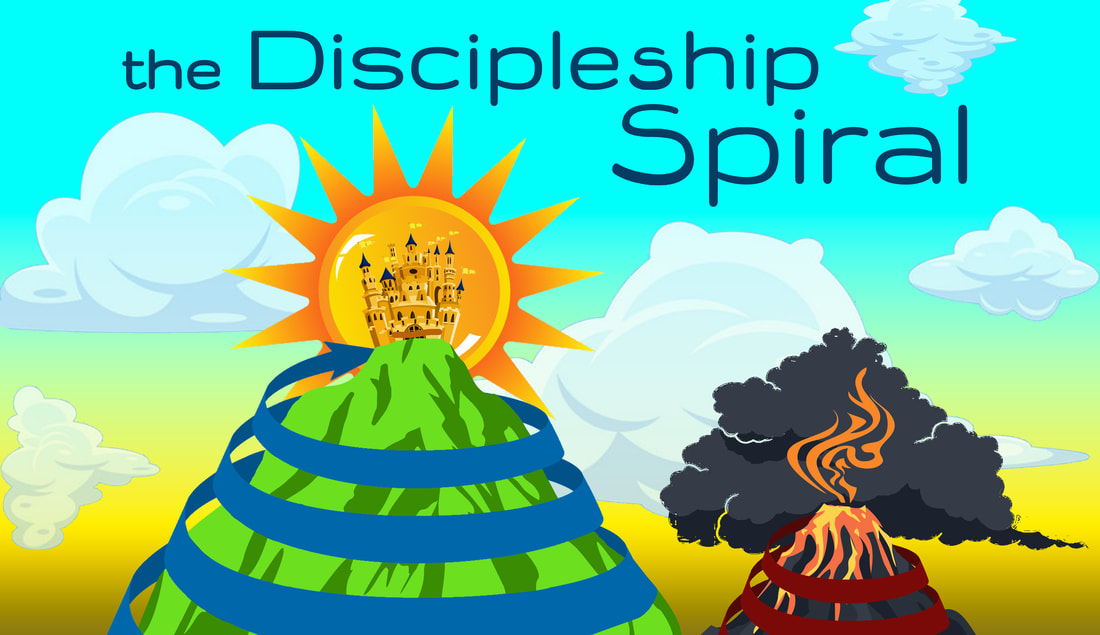Are you new to the Celebration of God? Click here for your first steps.Episode NotesClick the link below to download the PDF.
TranscriptIntroductionAre you a disciple of Christ? If you’re not sure, hopefully you will know for sure by the end of this episode. If you are a disciple of Christ, do you really know what that entails? Hopefully, we’ll all have a much better understanding of the biblical journey of a disciple by the time we’re done with this series. But even by the end of this episode, we’re going to learn the number one key concept of discipleship. But before we dive in today, I want to introduce you to Truth.Love.Parent. The Celebration of God was originally created as a resource for Christian parents who want to better disciple their kids. Of course, we know that The Year Long Celebration of God has significance and application to everyone regardless of whether they have kids or not, but — if you have kids — I invite you to subscribe to Truth.Love.Parent. Evermind Ministries is all about creating resources to help disciples of Christ at every mile of their journey, and Truth.Love.Parent., The Celebration of God, and our growing family of ministries are all amazing resources for your personal journey. And — speaking of resources — the notes for this series are really going to be invaluable. They will help you better understand the information and apply it to your life, but they will also help you pass this information on to your disciplees . . . whether they be your congregation, counselees, students, friends, or family. And please make plans to join us on Monday on the Wisdom app. This coming Monday at 11am EST, we’re going to dig deeper into today’s discussion. I’d love to hear about your personal journey as a disciple of Christ, and I’d love to take your questions about this topic so that we can all grow. Just download the Wisdom app, follow me @AMBrewster, and join me for the live conversation. And — even if you miss it — you can go back and listen as I discuss it with other people. Now, let’s get a redwood’s eye view of the whole journey of discipleship. TopicAccording to Merriam-Webster a disciple is “one who accepts and assists in spreading the doctrines of another.” That definition right there does a good job helping us see the full scope of discipleship. But I believe the definition of the Greek word most often translated “disciple” in the Scriptures is even more specific. The word mathetes is used of a learner. It comes from another Greek word that refers simply to learning. This root words speaks of thought accompanied by endeavor. I love the picture that gives us. And whether we’re learning in school or learning by experience, students have a teacher. Now, though the word “disciple” has a strictly religious connotation in our modern ears, the word was historically nearly indistinguishable from the words “students,” “pupils,” and “learners.” That, my friends, is what it means to be a disciple of Christ. The disciple of Christ has Jesus as His teacher. But not merely Jesus, He also has the Father and the Holy Spirit. All throughout the New Testament, Jesus and His apostles make is clear that Jesus is the second person of the triune Godhead. And they also teach that the Holy Spirit reminds us of what Jesus taught, and Jesus teaches that which comes from the Father. Therefore, a disciple of Christ is a follower of God’s truth. But the idea of following needs to be more clear in our minds. Salvation is not merely a future blessing; it’s a lifestyle. Having a relationship with God is a two-pronged responsibility. First, we have to learn Who God is and what He expects from us. And second, we have to obey and submit to what we learn about God and His expectations. That’s what it means to be a born again follower of Jesus Christ. That’s what it means to be a Christian. That’s what it means to be saved. There is no such thing as a person who will spend eternity in heaven who is also not a disciple of Jesus. There is no one who will avoid hell who is not learning from the Savior and striving to put into practice what he’s learning. To have a relationship with God, to be a child of God, is to be in a student/teacher relationship. Now, though our standing in Christ will not be graded on our performance as a disciple, there are four vital truths we have to recognize.
So, yes, though our learning doesn’t earn us salvation, it’s the proof that we have salvation. And we still need to recognize that God has High Biblical Expectations for our learning and living in this life — so much so that He will reward us based on the fidelity of our discipleship. At the beginning of the episode I asked if you are a disciple of Christ. If you trust that God’s truth is necessary for your life, and you believe what He has said about Jesus’ redemptive work on your behalf, and you are daily striving to grow into the image of Christ by the power of the Holy Spirit . . . then, yes, you are a disciple of Christ. But if you think you’re a disciple of Christ because you prayed a prayer, even though your life is lived for yourself according to what’s right in your own eyes, and you see no real reason to change and become more holy as God defines it . . . then, no, you’re not a disciple of Christ. You are not born again. You are not saved. You are not a Christian. God’s people aren’t perfect, but they understand that God has expectations for them that they need to learn and obey. But — though it may seem as if we have answered all of our questions and can now end the episode — we need to stop for a minute and really consider what it means to learn. A disciple is a student. Students learn. But what is learning? Honestly, when you were a full time student as a child, your definition of learning was probably very different than the definition of your classmates. I bet your teacher had a very different understanding of learning, and I promise you that God has the best definition of what it means to be a true disciple of Christ. So, the rest of this series is going to be about identifying and explaining the biblical facets of learning — of being a disciple. We’re going to see that the journey of discipleship is not what we often think. When we picture a trip or travel in our mind, we picture a line that starts in one place and leads to another. And that is a valid picture. But in this study we’re going to learn about the spiral nature of discipleship. In fact, we could refer to it as the Worship Spiral or the Learning Spiral. They’re all identical concepts, and we’ll revisit this observation as we progress. But, for the remainder of this episode, we want to take a step back and really solidify in our minds the reality that God not only created everyone everywhere to learn, He commands them to learn, and He capacitates them to learn. So, let’s finish off by considering . . . 1. God created you to learn about and become more like Him. I want you to think about learning in its most general form. If you were incapable of learning, you would all be unable to move. But you had to learn to roll over, crawl, stand, walk, and run. If you were incapable of learning, you wouldn’t be able to communicate. Regardless of the languages you use, you learned to make sounds and then link those sounds together to form words and link those words together to form ideas. And — as you’ve grown — your communication should have matured with you. Lastly, if you were incapable of learning, you wouldn’t even know how to eat. Yes, children are born with some very basic instincts concerning the necessity of food and how to eat it, but they still need to be helped to learn to do it correctly and efficiently. Think about it this way — if God had not created you to learn . . . you would have died days after birth. This is a very important realization for us for two reasons. Once we graduate from school, many of us believe that we’re done learning. That could not be further from the truth. But we also often try to convince ourselves that we can’t learn new concepts or lessons that are “too hard.” The truth of the situation is usually that we simply don’t want to learn the new material because it’s uncomfortable, so we convince ourselves it’s too hard. Let me land on this idea of “too hard” for a minute. Is Math or Science or English or mechanics or Chemistry or Economics or Speech really hard? What about theology? Is it a hard subject? Is it too hard for some people? In order to answer that, we need to ask “What does hard mean?" When the word “hard” is used in situations like this, the word is generally intended to mean “difficult.” The tenth definition of “hard” in the Merriam-Webster dictionary is “difficult to accomplish or resolve.” But even the idea of being difficult is subjective. Sure, something may be hard for me, but what if it’s not hard for someone else? Does that means it’s objectively hard? Even if it’s subjectively hard, how can I know for sure it really is hard for me? Ah, as Shakespeare would say, “Therein lies the rub.” If I tried to teach you Chinese, many of the people listening to me would complain that it’s “too hard.” But I would reply, “Toddlers in China do it all the time. That doesn’t sound very hard.” You see, if it’s truly too hard, then someone younger and less intelligent than you shouldn’t be able to do it. The real crux of the matter is not that something is too hard, it’s that it’s new. It’s different. It’s novel. When we encounter the deep and unfathomable truths of God, don’t allow yourself to feel as if it’s too hard to learn. It may be difficult right now, but it’s not too difficult. You can learn it, and as you become better acquainted with the information and as you practice what God commands, it will cease being “hard.” In fact, one day you will consider it so easy that you won’t even struggle with new concepts the way you did before. And you definitely won’t have a bad attitude toward God because He’s being unreasonable by asking you to do something that’s impossible. Consider one more real life example. Assuming that your body functions normally, most of the people listening to my voice can walk. Now, none of you can remember what it was like learning to walk, but most of you have watched other people learn to walk. Babies don’t complain that it’s too hard. They’re generally excited to learn this very new and challenging skill, and regardless of how many tumbles they take, how many times they bump their heads, and how many times they scrape their knees, babies continue to practice undaunted. And the cool thing is that most children aren’t technically “taught” to stand or walk or run. They learn it naturally. So, generally speaking, it’s not that the truth to be learned is genuinely too difficult for us to learn, we’ve just gown into an overdeveloped sense of pride, arrogance, and laziness. Pride keeps you from wanting to learn. Arrogance convinces you that you already know what you need to know. And laziness makes you certain that doing something less strenuous and more “fun” would be better. All of this to say that God created you and your fellow disciples to learn. The fact that you’re sitting there listening to me and understanding what I’m saying is proof of that fact. But we need to embrace discipleship for more reasons than the fact that we were created to learn. 2. God commands you to learn about and become more like Him. That’s right. God commands you to be a disciple, to learn. Consider Proverbs 9:9: “Give instruction to a wise man, and he will be still wiser; teach a righteous man, and he will increase in learning.” Now, that passage could sound simply like cause and effect. Wise and just people simply increase in learning, but it’s not appropriate to say that it’s a command. So consider Proverbs 1:5: “Let the wise hear and increase in learning, and the one who understands obtain guidance.” And consider Isaiah 1:17 where we’re very bluntly told to, “Learn to do good.” And then II Timothy 3:14 exhorts us to, “continue in what you have learned and have firmly believed, knowing from whom you learned it.” And we could look at a nearly unending list of passages that command you to learn what God is teaching and act accordingly. All of these passages make it clear that God expects you to learn. He expects you and your fellow disciples to learn about Him and submit to what you have learned. And this makes perfect sense. God created you to learn, why wouldn’t He expect you to do what He created you to do? This has application for everyone in your life. Whether you’re a pastor, counselee, student, parent, teacher, counselor, part of the body of Christ, or a friend . . . I hope that you have a regular habit of learning and studying and growing in the things of God. In fact, when it comes to spiritual things, we will be learning new things about God for all eternity — even in a perfect state! Learning is not just something for broken sinners. But I know what many of you are thinking. “Listen, I understand what you’re saying, but what I’m being asked to do is genuinely too hard. You don’t know what I read in the Bible. You don’t know what my pastor said. You don’t know how my brain works. You don’t know how impossible it is to do what God says.” Picture this. What if I asked you to pick up my car. And this is not a trick question. I’m not referring to a toy car. I want you to pick up my Kia Sedona. It weighs about 4,500 pounds. Initially, you would consider that an impossible feat. Then some of you would wonder if there were any restrictions on my command. You’d be curious if I expected you to do it by yourself in your own strength. Even if I told you that all I wanted you to do was to get the car off the ground and that you didn’t have to do it in your own strength, some of you would still throw up your hands and say it couldn’t be done because you don’t have access to the necessary resources. But what if I told you to lift my van off the ground, and what if I told you that I would provide you anything and everything you might need in order to do it. Now, whereas before it seemed too hard, now you’re excited just thinking about the possibilities. Some of you are thinking about hiring a bunch of strong men to lift it up. Some of you are imagining renting a crane. Some of you may even be picturing a contraption that would make Wiley E. Coyote proud and would probably involve a rocket and roller skates. My point is, once you realize that all of the necessary resources are available to you, it makes an otherwise impossible task seem easy. And you’re right. I may not know how your mind works, I don’t know what your pastor said, and I don’t know what God is trying to teach you right now, but I do know that God not only created you to learn and commands you to learn . . . 3. God capacitates you to learn about and become more like Him. “Capacitate” means to make something capable. Whereas you weren’t able to do it on your own, God gives you everything you need to learn and apply what He’s teaching you. I love Proverbs 2:6 — “For the Lord gives wisdom; from his mouth come knowledge and understanding.” Remember that learning is simply the acquisition of knowledge. This verse tells us that knowledge and understanding both come from God. That means that you need Him in order to learn anything. This is true in two senses. A. By God’s common grace He’s created all of us to learn and provides us the skills necessary to learn what we must learn. B. More specifically, as children of God we know that the Holy Spirit helps us to learn unique things and learn them in a unique way. Unbelievers don’t have access to that level of understanding. Do you believe that? Do you honestly believe that God will give you the strength and power necessary to learn whatever He tasks to learn? Do you also believe that God wants you to be an eternal student? Do you believe that He wants you to learn about Him from His Word? Do you believe that He wants your pastors and disciplers and friends and family to teach you about life and godliness from the Bible? Most of our attitudes concerning learning would drastically change if we simply acknowledged that God would never ask us to do anything that He has will not also equip us to do. Of course, on the flip side of that point, we must not naively assume that God will cause us to learn everything we need to learn without our expected effort. It wouldn’t matter if I gave you $1,000,000 to lift my van. If you did nothing, the van wouldn’t move an inch. We need to acknowledge that though the Lord provides learning to all who ask . . . we must work for it. Proverbs 8:17 tells us, “I love those who love me, and those who seek me diligently find me.” In this passage, wisdom is being personified as a woman, and she makes the important observation that we won’t simply learn without putting in the effort. ConclusionThat is journey of a disciple. Discipleship is learning — from beginning to end — God created us to learn, commands us to learn, and capacitates us to learn.
That means that He created us to be His disciple, He commands us to be His disciple, and He capacitates us to be His disciple. Now, on our next episode we’re going to get even more detailed about what it means to actually be a disciple. Yes, it means that we should be students of God. But — as I mentioned earlier — our definition of learning is likely very different than God’s definition of learning. What I call the Discipleship Spiral is going to teach us the specific elements of discipleship. Unless all four are in place, we’re not really being good disciples of Christ. In fact, as we study the Discipleship Spiral, we may discover that we’re not really disciples of Christ the way we thought. In fact, as we compare our life to the Discipleship Spiral, we may discover that we’re not actually a disciple of God. Now, wouldn’t it be cool if you and your fellow disciples could learn this material together as you seek to help each other become better disciples? There are many ways to do that. You could share this episode with them on social media or via email or text. You could get together once a week to listen to the episodes and discuss them. You could even use the notes as a small group Bible study. You and your fellow disciples could also join me on the Wisdom app to ask questions and share what you’re learning about being a disciple of Christ. That would be awesome! Either way, God expects us all to be growing disciples, so why not share what you’re learning with your disciplees? So, please join us next time as we look at the first third of the Discipleship Spiral and discuss disciples as Zealous Students. I’ll see you then!
0 Comments
Leave a Reply. |
The Year Long Celebration of God is a dynamic, holistic resource that utilizes the Bible, our holiday calendars, and even the most average moments of the most normal days to equip Christians to worship God all year long
and disciple others to do the same. AMBrewster is the creator and host of the Celebration of God. He originally designed the COG to be a discipleship tool for Christian parents to train their children to know and love God, but he quickly realized how valuable it is for all Christians. Whether it's a small group, church, classroom, one-on-one, or community relationship, this resource is guaranteed to draw people closer together as they draw closer to God. Aaron is the President of Truth.Love.Parent. and host of its podcast. Archives
July 2022
Categories
All
|
||||||||
Truth.Love.Family.
- Truth.Love.Family.
- Donate
-
Podcast
-
Special Guests
>
- Ryan & Kim Ahrens
- Scott & Becky Aniol
- George Barna
- Dave Bender
- Alan Benson
- Carolyn Brewster
- Tim Challies
- Natasha Crain
- Kristen Clark
- Hillary Morgan Ferrer
- Todd Friel
- Ken Ham
- Jay Holland
- Kristen Jenson
- Chris Kaspar
- Becky Keife
- Heath Lambert
- Jessica Mair
- Dr. Joe Martin
- Mark Massey
- Katie Miller
- Jim Newheiser
- Steve Pettit
- Shannon Popkin
- Aaron & Elaina Sharp
- Mark Shaw
- Lynna Sutherland
- Nathan & Anna Sutherland
- Brandon Talley
- Arthur C. Woods
- Episodes by Series
- Episodes by Topic
- Where to Listen
-
Special Guests
>
- Community
-
Resources
- Counseling
- Speaking
- The Celebration of God
- AMBrewster.com
- Evermind Store
|
To submit general questions or ideas for future episodes: [email protected]
To request specific assistance for your family: [email protected] |
We are a participant in the Amazon Services LLC Associates Program. As an Amazon Associate, we earn from qualifying purchases. Click any Amazon link at TruthLoveParent.com, shop as usual, and TLP will receive commissions off all of your sales! Click here to learn more.
Site powered by Weebly.








 RSS Feed
RSS Feed
